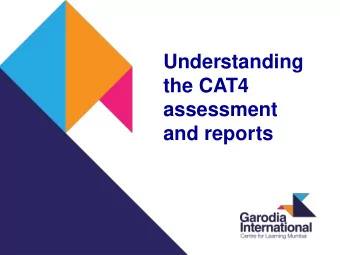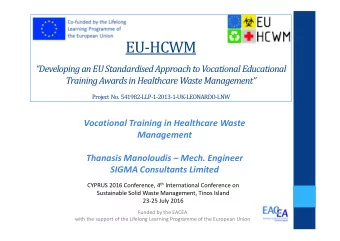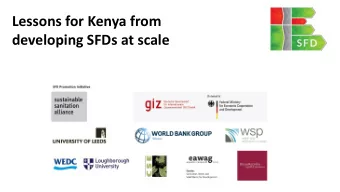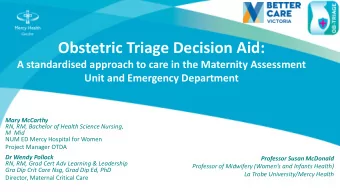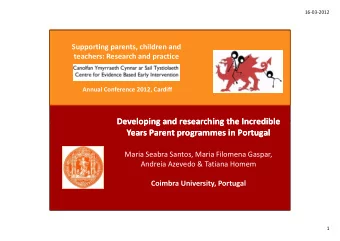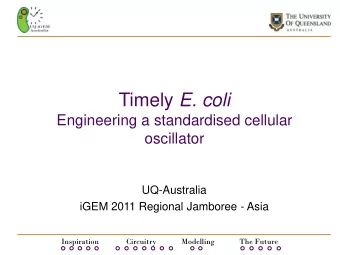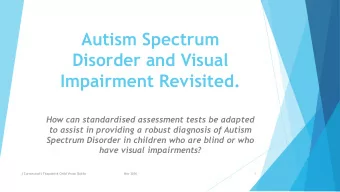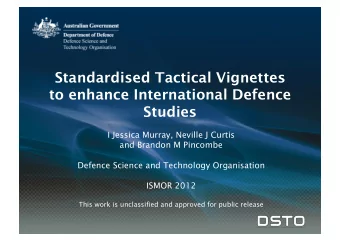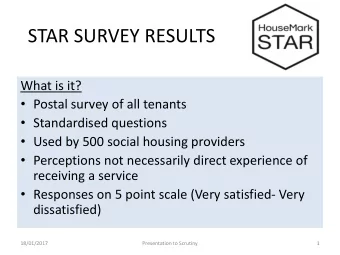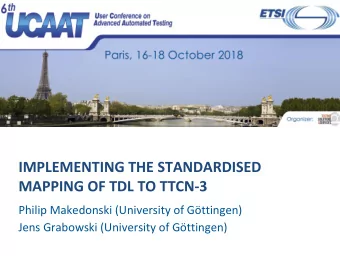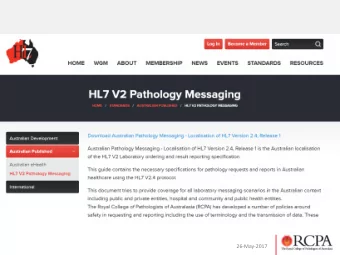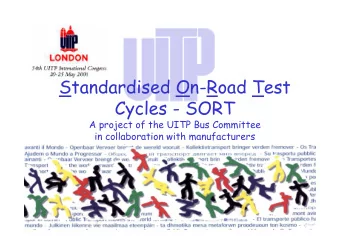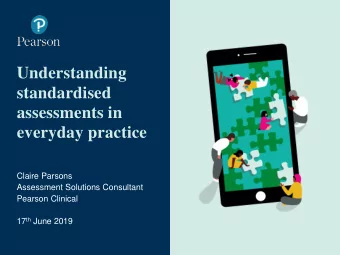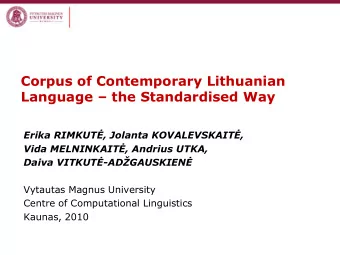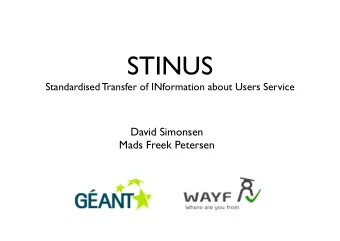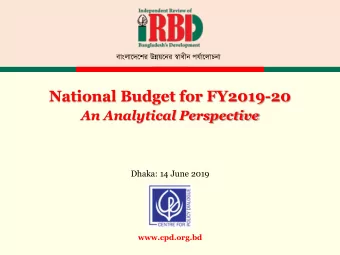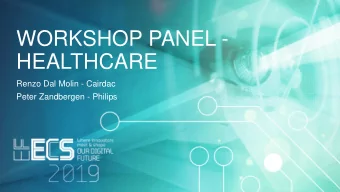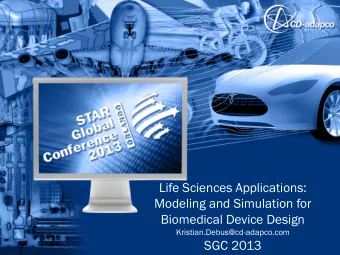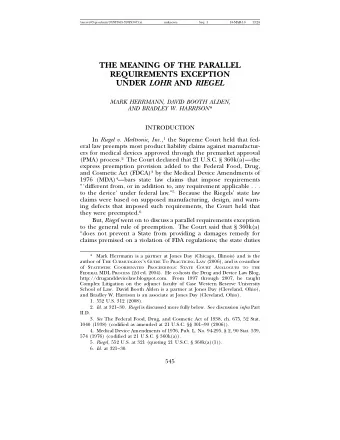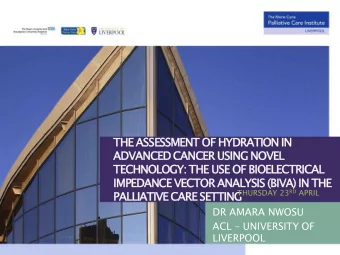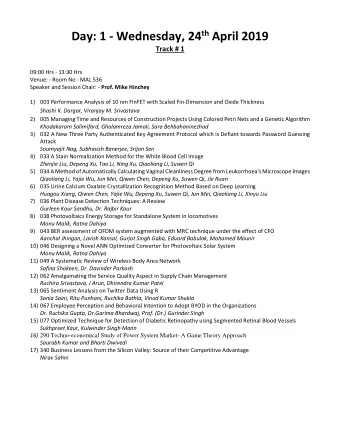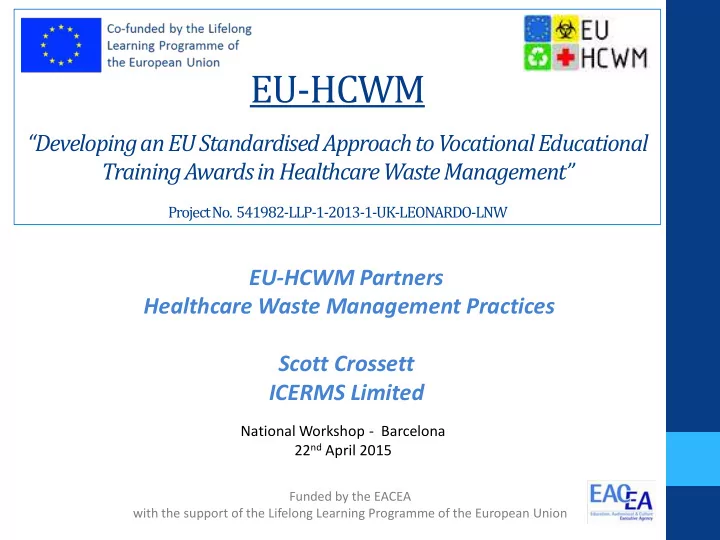
EU-HCWM Developing an EU Standardised Approach to Vocational - PowerPoint PPT Presentation
EU-HCWM Developing an EU Standardised Approach to Vocational Educational Training Awards in Healthcare Waste Management Project No. 541982-LLP-1-2013-1-UK-LEONARDO-LNW EU-HCWM Partners Healthcare Waste Management Practices Scott Crossett
EU-HCWM “Developing an EU Standardised Approach to Vocational Educational Training Awards in Healthcare Waste Management” Project No. 541982-LLP-1-2013-1-UK-LEONARDO-LNW EU-HCWM Partners Healthcare Waste Management Practices Scott Crossett ICERMS Limited National Workshop - Barcelona 22 nd April 2015 Funded by the EACEA with the support of the Lifelong Learning Programme of the European Union
ICERMS Limited • Started 2002 • Est. 2010 through merger • National Vocational Training Centre for Waste & Environment Sectors • Consultancy in Solid Waste Management & Environment • Healthcare Waste Management
ICERMS Limited Operate out of Fairlie a small village about 50 km southwest of Glasgow on the coast. Mostly work in UK; EU; Accession States in Balkan Peninsula but have worked around the world – Afghanistan; Iceland; Jamaica; Mauritius; Mozambique; South Africa
EU-HCWM • UK • Greece • Poland • FYROM • Slovenia • Albania
Question 1 • Currently there are many treatments that are not necessarily carried out anymore within the HC centres but at the patient’s home. This waste can also include sharps and even cytotoxic substances. • How do you manage in your countries the HC waste generated within home care treatments? • Is the patient responsible for it? • Is he/she allowed to put it into the domestic waste containers? • How is your waste legislation dealing with it? • Are there initiatives in your country related to regulations and standards for medical waste patient self-management? • Are there in your country initiatives of medical waste patient self- management that involves the pharmaceutical producers to its extended producer responsibility (EPR)?
Question 1 Poland - Nurse/Doctor removes waste that they produce – Self Treatment (Patient Responsible – Domestic Waste) – No legislation - Pharma waste returned to Pharmacy FOC FYROM - Nurse/Doctor removes waste that they produce – Self Treatment (Patient Responsible – Domestic Waste) – No legislation Greece - Domestic waste and no legislative provisions Slovenia - Nurse/Doctor removes waste that they produce – Self Treatment (Patient Responsible – Domestic Waste) – No legislation UK – Nurse/Doctor removes waste that they produce – Self Treatment (Patient/Healthboard/Local Authority) – No legislation – Pharma waste returned to Pharmacy FOC Albania – Domestic waste and no legislative provisions
Question 2 Are plastic bags always used for any kind of HC waste so that the plastic containers can be reused? Or waste is put in the plastic containers directly and then the containers are destroyed together with its content?
Question 2 Poland – Single Use Only FYROM – Single Use Only Greece – Single Use Only Slovenia – Single Use Only UK – Plastics bags are single use but most sharps boxes are recyclable Albania – Single use ONLY
Question 3 Are pedal waste bins compulsory? Are they systematically used?
Question 3 Poland - Compulsory FYROM - Compulsory Greece - Compulsory Slovenia – Compulsory UK - Compulsory Albania – Not yet Compulsory
Question 4 Are sharps sterilized and metal recovered or is everything destroyed?
Question 4 Poland – All destroyed FYROM – All destroyed Greece – All destroyed Slovenia – All destroyed UK – All contents destroyed BUT sharps boxes re-used Albania – All contents destroyed
Question 5 Which is the average cost per kg of HC waste treatment in your country?
Question 5 Poland - € 0.7 to € 1.00/kg FYROM - € 1.00/kg Greece - € 0.52 to € 1.76/kg Slovenia - € 1.00/kg UK - € 556.00 - € 835.00/tonne Albania - € 3/kg however this includes provision of plastic bags, sharps boxes AND transport
Question 6 Does your HC waste legislation establish that the HC centre has to formally designate a HC waste responsible?
Question 6 Poland - No FYROM - Yes Greece - No Slovenia - Yes UK – No Albania - Yes
Question 7 Is it compulsory for HC centres to monitor waste management? If yes, is kg or m 3 used as a standard measure unit?
Question 7 Poland – Yes, kg FYROM – Yes, kg Greece – Yes, kg Slovenia – Yes, kg UK – Yes, kg Albania – No, kg
Question 8 Are human body parts incinerated or sterilized and then sent to landfills?
Question 8 Poland - Incinerated FYROM - Buried Greece - Incinerated Slovenia - Incinerated UK - Incinerated Albania – Incinerated/Buried
Question 9 Is there a compulsory colour code for HC waste containers? If yes, is it the same in all the country?
Question 9 Poland - Yes FYROM - Yes Greece - Yes Slovenia - NO UK – Yes – NHS guideline (Scotland; Northern Ireland; England & Wales) Albania – Yes there is a law however it is not applied
Question 10 Do pharmaceutical companies usually collect waste from pharmaceutical products. Is it a free service?
Question 10 Poland - Yes via Hospital Pharmacies FYROM - No Greece - No Slovenia - Yes via Hospital Pharmacies UK – Yes via Hospital Pharmacies Albania - No
Question 11 Do pharmaceutical companies usually collect waste from hospitals’ pharmaceutical products? And is it a service paid by them as an EPR service? Are there in your country initiatives of hospital pharmaceutical medicines and drugs that involve the pharmaceutical producers to its extended producer responsibility (EPR)?
Question 11 Poland – No EPR FYROM – Yes although EPR does not yet apply to pharmaceutical waste from the hospital Greece – No Slovenia – Yes all through EPR service UK – Yes through EPR Albania - No
Question 12 Is glass from HC waste recycled in your country? Is it recycled together with domestic glass waste? Is it previously washed or treated in some way?
Question 12 Poland – Recycled once sterilised FYROM – Not Recycled Greece – Not Recycled Slovenia – Recycled once sterilised UK – Recycled once sterilised Albania – Not Recycled
Question 13 • Which is the HEPA filters waste management in your country? • In which containers/conditions are the HEPA filters transported?
Question 13 Poland – Managed as a separate waste stream and by a specified contractor FYROM – No Information Greece – No specific method of disposal Slovenia – Bagged for transportation no specified disposal route UK – Wrapped and sent for Incineration Albania – Landfilled
Question 14 • Which is the documental system that is used in your country to control HC waste transportation and waste management?
Question 14 Poland - ADR Regulation applies FYROM - ADR Regulation applies Greece - ADR Regulation applies Slovenia - ADR Regulation applies UK – ADR Regulation applies plus Waste Transfer notes (NHW) and Waste Consignment notes (HW) Albania – ADR Regulation applies BUT not complied with in the healthcare waste sector
Question 15 • Which is the waste management of medical electronic appliances or implanted electronic devices such as: artificial pacemakers, baclofen pumps, dialysis machines, and glucosemeters? • Are they managed as EEW? If yes, are they disinfected at the HC premises before? • Which is the waste management of these medical electronic devices if they have batteries?
Question 15 Poland - All WEEE and Batteries etc. managed as a separate waste stream and collected by a specialist contractor for recycling. Not cleaned before collection FYROM - All WEEE and Batteries etc. managed as a separate waste stream and collected by a specialist contractor for recycling. Cleaned before collection Greece - All WEEE and Batteries etc. managed as a separate waste stream and collected by a specialist contractor for recycling. Cleaned before collection Slovenia - All WEEE and Batteries etc. managed as a separate waste stream and collected by a specialist contractor for recycling. Cleaned before collection UK – All WEEE and Batteries etc. managed as a separate waste stream and collected by a specialist contractor for recycling. Cleaned before collection Albania – All WEEE and Batteries are sent to landfill through the domestic waste stream
Pre-Acceptance Waste Audit From 1st October 2010 some producers of healthcare related waste have been required to assess the composition of the waste they produce and inform their waste contractor, in order to assist in its safe collection and disposal. The Environment Agency has prioritised the applicability of this requirement, based on risk, and so pharmacy contractors have been subject to these requirements from 1st July 2013. Waste contractors will be unable to collect waste from a pharmacy until it has been satisfied that an audit has been carried out, to identify the waste streams and so that it can ensure appropriate disposal.
Recommend
More recommend
Explore More Topics
Stay informed with curated content and fresh updates.
